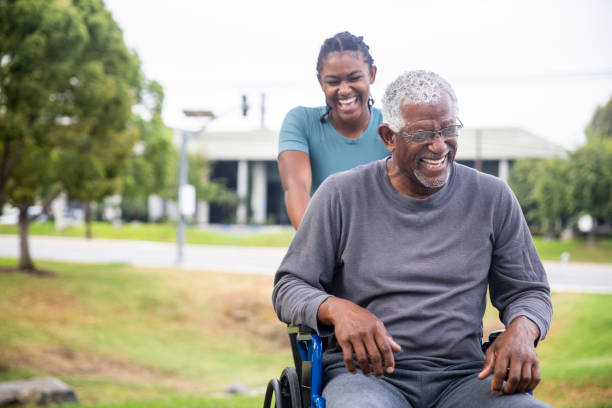
One million people in the U.S. live with Parkinson’s disease (PD), the second-most common neurodegenerative disease after Alzheimer’s disease. No two people with PD experience the same symptoms, responses to treatment or progression, and care partner experience. While caregiving comes with its own rewards, stress and burnout are common when caring for someone with a chronic illness.
November is National Family Caregivers Month. Take time this month to honor and support the care partners in your life. If you are a care partner, remember it is healthy to prioritize your self-care and ask for the support you need.
The Care Partner Role
A care partner is anyone who is caring for a person living with Parkinson’s. People with PD may have several care partners who share in the role of caregiving — a spouse, adult child, extended family member, and friends.
The responsibilities of care partners may include helping a loved one with daily activities, managing medications, and making financial decisions. Whatever your responsibilities, define the role of caregiving for yourself. Early in the PD journey, you may not feel like you are actually “giving” care. Similarly, your loved one may not see themselves as someone in need of care. But remember, care is not limited to physical tasks. Care can be emotional and spiritual as well as physical.
RELATED: PD 101: What is Parkinson’s Disease?
Caring for You
While your loved one’s PD diagnosis probably changed your life overnight, becoming a care partner is a role and an identity that you grow into. It does not have to erase or replace the current ways you see yourself or the existing roles you play. Remember that your needs matter too; if you do not take care of yourself, you will not be able to take care of your loved one.
Whether you care for someone who is recently diagnosed with Parkinson’s disease, are adapting to new challenges as the disease progresses, or have been caring for someone with PD for a long time, a strong support network is essential for your well-being. Some find it challenging to be open with friends and family about what they are going through as a care partner. It is also normal to have hesitations about sharing these more private and personal experiences. However, making sure that you find a support network that works for you can help create a productive partnership that minimizes stress and conflict.
You and your loved one with PD are not alone. Finding a network of people with whom you can share experiences provides opportunities for connections and can help prevent feelings of isolation. Consider joining a support or prayer group at your church, mosque, or another house of worship or a support group for PD care partners.
RELATED: Top Ways to Treat Parkinson’s Disease
Caring as a Family
PD affects the whole family; for many, caregiving is deeply rooted in cultural values. Although there may be one primary care partner, family and friends sometimes help to provide additional support. Things like driving to medical appointments, preparing meals, and simply spending time with the person who has PD can allow the primary care partner to find some time for themselves. All caregiving tasks are important — big or small.
People who live far away often want to be helpful in ways that are feasible and meaningful but may not know how. Living far from your loved one does not mean you are not involved or do not care. There are many ways you can still help. Ask your loved one and their primary care partner what you can do to provide support. For example, calling the person with PD on a regular basis may provide a needed mental boost, or sending a meal through a delivery service can change someone’s day.
Find Resources for Care Partners at Parkinson.org
- Caring and Coping: A Care Partner’s Guide to Parkinson’s Disease offers tips and tools to help prepare you for every step of the care partner journey.
- Care Partner Program is a free online program with self-paced courses designed by and for Parkinson’s care partners.
- PDConversations.org/Caregiving is a virtual support community where care partners can share their stories and tips.
- Care to Talk cards help spark meaningful conversations about the caregiving experience.
This content was developed in partnership with the Parkinson’s Foundation. To learn more about Parkinson’s disease and find resources to help you live better with Parkinson’s, visit Parkinson.org or call the Parkinson’s Foundation Helpline at 1-800-4PD-INFO (1-800-473-4636).










